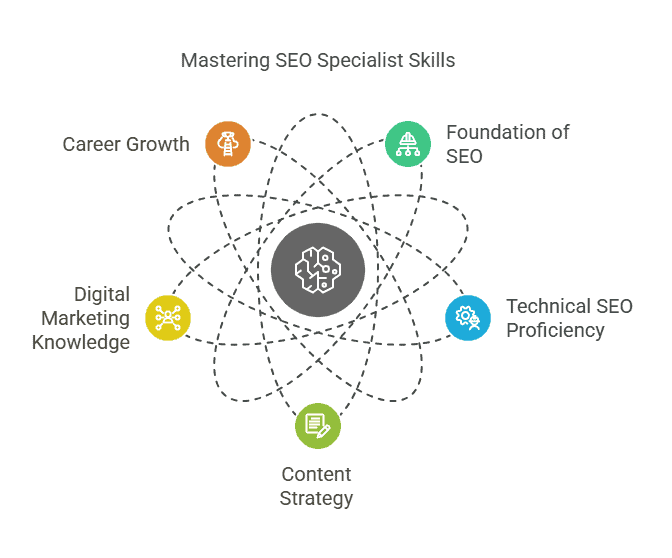Exploring Search Engine Optimization shows that becoming an expert needs many skills. You need technical, creative, and analytical abilities. This mix is key to success.
If you’re starting or growing your career, check out Write Remotely. It’s great for finding SEO specialist jobs and the latest opportunities.
Key Takeaways
- Understanding the basics of search engine optimization is key.
- Technical skills, like keyword research and link building, are vital.
- Creativity in content creation is important for keeping audiences engaged.
- Analytical skills help in tracking and boosting SEO strategies.
- Keeping up with new trends and algorithm changes is essential.
The Foundation of SEO Specialist Skills
As I started my SEO career, I learned that a solid foundation is key. This foundation includes many skills that are vital for any SEO specialist.
Understanding Search Engine Algorithms
Understanding how search engines work is a core part of SEO. This means knowing how Google Algorithm Proficiency works. It’s about how search engines rank and find data.
Google Algorithm Proficiency
Knowing Google’s algorithms well is very important. It helps SEO specialists make content better and rank higher in search engines.
Mastering Keyword Research and Analysis
Keyword research and analysis is another key skill. It helps specialists find the right words and phrases to bring more visitors to a website.
Developing Analytical Thinking
Analytical thinking is also critical for SEO specialists. It lets them understand data, spot trends, and make smart choices for their SEO plans.
My Approach to Learning SEO Fundamentals
To learn SEO basics, I keep up with new trends and best practices. If you’re thinking about an SEO career, check out “Write Remotely” for the latest job listings.

Essential Technical SEO Proficiency for Specialists
My journey to becoming a proficient SEO specialist started with learning technical SEO skills. I soon found out that technical SEO is the base for all SEO strategies.
Website Structure and Architecture Optimization
A good website structure and architecture are key for search engines and users. They help organize content in a way that’s easy to find and use.
Crawlability and Indexation Techniques
To help search engines crawl and index a website, optimizing robots.txt, meta tags, and internal linking is vital. For example, a well-structured robots.txt file helps search engines understand a website better.
Page Speed Optimization Techniques
Page speed is important for both user experience and search rankings. Compressing images, using browser caching, and minifying CSS and JavaScript files can speed up pages. Tools like Google PageSpeed Insights can help find ways to improve.
Mobile-Friendly Design Implementation
Most searches are now on mobile devices. So, having a mobile-friendly design is essential. This means using responsive design to make sure websites look good on all devices.
Schema Markup and Structured Data
Schema markup and structured data help a website show up better in search results. By adding schema markup to HTML, webmasters give search engines more context about their content.
Rich Snippets and Enhanced SERP Features
Schema markup can lead to rich snippets and other special features in search results. These features, like review stars, make a website’s listing more attractive and informative.
For those wanting to grow in their SEO career, keeping up with the latest trends is key. For the latest SEO specialist jobs, check out platforms like Write Remotely.
Key technical SEO skills include:
- Understanding website structure and architecture optimization
- Mastering crawlability and indexation techniques
- Implementing page speed optimization techniques
- Designing mobile-friendly websites
- Utilizing schema markup and structured data
Content Strategy and Digital Marketing Knowledge
In SEO, a good content strategy is key, not just helpful. As I learned about digital marketing, I saw that a solid content strategy is vital. It’s about making content that people and search engines love.
Creating SEO-Friendly Content
Making content that’s good for SEO is tricky. It’s about mixing a great story with the right keywords. I aim to create content that’s both useful and follows SEO rules.
On-Page SEO Best Practices
On-page SEO helps your content get seen more. This means making sure meta tags, headings, and mobile-friendliness are all on point. By doing this, I can help a web page rank better.
Content Gap Analysis and Opportunity Identification
Doing a content gap analysis helps find new content ideas. It shows what’s missing and lets me create content that meets those needs.
Integrating SEO with Broader Marketing Strategies
SEO works best when it’s part of a bigger marketing plan. It should match up with social media and brand messages to have the biggest impact.
Social Media and SEO Synergy
Social media and SEO work together well. Social media might not directly affect rankings, but it can bring more people to your content. This can help your SEO.
Key Strategies for Content and SEO Integration:
- Develop a detailed content calendar
- Use social media to spread your content
- Keep an eye on your analytics to make changes
| Strategy | Description | Benefit |
| Content Calendar | A planned schedule of content publication | Consistency and reduced content creation stress |
| Social Media Amplification | Using social media platforms to increase content visibility | Increased reach and possible viral sharing |
| Analytics Monitoring | Tracking the performance of content and SEO efforts | Data-driven decision making for strategy adjustment |
If you want to grow in SEO, keep up with new trends and methods. For the latest SEO jobs, check out Write Remotely.
How I Developed Advanced SEO Specialist Skills for Career Growth
I kept working on my SEO skills, aiming for the top. I focused on advanced methods to boost my career.
Link building was a big focus for me. It’s key for a website’s authority and ranking.
Link Building Strategies and Techniques
I learned many link building methods. These included guest blogging, finding broken links, and creating resource pages. These strategies helped get me quality backlinks, boosting my site’s visibility.
I used Ahrefs to find link building chances and reached out to relevant sites.
SEO Reporting and Data Visualization
SEO reporting and data visualization were also key. I learned to make detailed reports on SEO metrics like keyword rankings and traffic.
With Google Data Studio, I could make complex data easy to understand. This made sharing insights with clients and stakeholders simpler.
Adapting to Algorithm Updates
Keeping up with algorithm changes is vital. I regularly checked blogs and webinars to stay informed.
This helped me adjust my strategies. I ensured my clients’ sites followed the latest best practices.
Local SEO and International SEO Expertise
I also became skilled in local and international SEO. I learned to optimize for different areas and languages, growing my client base.
For example, I used Google My Business to boost local listings and visibility.
Tools I Use for Search Engine Optimization
I rely on Ahrefs, SEMrush, and Google Data Studio for SEO. These tools make my work more efficient and effective.
| Tool | Function | Benefits |
| Ahrefs | Link building and keyword research | Improves website authority and search engine ranking |
| SEMrush | Technical SEO audit and competitor analysis | Identifies areas for improvement and provides competitive insights |
| Google Data Studio | Data visualization and reporting | Presents complex data in a clear and concise manner |
For the latest SEO specialist jobs, visit Write Remotely.
Conclusion: Leveraging Your SEO Specialist Skills in Today’s Job Market
The digital world is always changing. Using your SEO skills well is key to growing your career. By knowing both technical SEO and digital marketing, you can boost your career and keep up with the job market.
It’s important to keep learning about new trends and methods in SEO. If you’re looking for new chances, check out Write Remotely. It has the latest SEO jobs and can help you move forward in your career.
FAQ
What are the essential skills required to become an expert SEO specialist?
To be an expert SEO specialist, you need many skills. You must understand how search engines work. You also need to know how to find and analyze keywords.Developing analytical thinking is key. Plus, having technical SEO skills is important.
How important is Google Algorithm Proficiency for an SEO specialist?
Google Algorithm Proficiency is very important. It helps SEO specialists know how search engines rank websites. This knowledge is used to optimize content.
What is the significance of content strategy in SEO?
A good content strategy is vital for SEO success. It means creating content that search engines like. You also need to follow on-page SEO best practices.Doing a content gap analysis helps find opportunities. This way, you can improve your content strategy.
How does technical SEO proficiency impact search engine rankings?
Technical SEO skills are key for better search engine rankings. They help optimize website structure and architecture. This makes sure websites are easy for search engines to crawl and index.Improving page speed is also important. These technical SEO practices help websites rank higher.
What role does link building play in SEO?
Link building is very important in SEO. It’s about getting high-quality backlinks from trusted sources. These backlinks boost a website’s credibility and rankings.
How can I stay updated with the latest SEO trends and best practices?
To keep up with SEO trends, visit platforms like Write Remotely. They offer the latest SEO jobs and insights.
What tools are commonly used for search engine optimization?
As an SEO specialist, I use many tools. These include tools for keyword research, technical SEO audits, and backlink analysis. They help me work more efficiently and get better results.
How does local SEO differ from international SEO?
Local SEO focuses on optimizing for a specific geographic area. International SEO, on the other hand, aims for multiple countries and languages.


 Owner of Write Remotely. Connecting businesses with talented writers and empowering remote work.
Owner of Write Remotely. Connecting businesses with talented writers and empowering remote work. 

